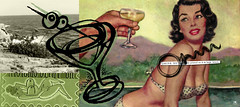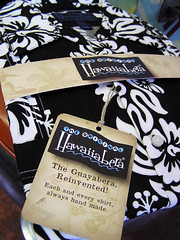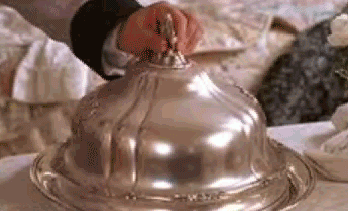The Goal Is Soul
U2: The Catharsis in the Cathedral
DUBLIN -- THROUGH the windows of Hanover Quay, the rehearsal and recording studio that U2 has called HQ for the last two decades, streetlights made rippling patterns on the Liffey, the river that runs through Dublin, matching the shimmering overtones coming from the Edge's guitars as the band ran through songs from its new album, "How to Dismantle an Atomic Bomb" (Interscope).
Gearing up for a year of promotion and touring to follow the release of the album on Nov. 23, U2 was methodically at work, translating multilayered studio creations into songs that would allow four musicians to rock arenas again. U2 is to play a handful of small-scale shows this month, including an appearance Nov. 20 on "Saturday Night Live," and will start a world tour of arenas and stadiums on March 1 in Miami.
The Edge had two dozen guitars at his feet, and an assistant noted which guitar, which effect and which setting would be used for each section of each song. Larry Mullen on drums and Adam Clayton on bass were scrutinizing rhythm tracks, trying to strip away clutter without losing swing.
As the band plunged into "Vertigo" and "All Because of You," the sound of early U2 - the Who's power chords blasted into U2's own domain of spaciousness and yearning - was merged with an added 25 years of experience, experiments and world-beating success. Standing with one leg forward and one behind him, Bono rocked back and forth and belted, "I'm at a place called Vertigo/It's everything I wish I didn't know/Except you give me something I can feel."
Tensions between intellect and passion, and between pragmatism and faith, drive the songs on "How to Dismantle an Atomic Bomb"; so do burly guitar riffs, galvanizing crescendos and fearlessly emotional vocals. The album easily stands alongside the best work of U2's career - "Boy," "War," "The Joshua Tree" and "Achtung Baby" - and, song for song, it's more consistent than any of them.
U2 is almost alone now among rock bands in its determination to merge lofty ambition and pop impact. With songs that determinedly blur divine and earthly love, seeking grace as often as romance, the band doesn't pander to vulgar impulses. Yet U2 has no interest in being a hipsters' cult band; it has always aimed for audiences that can fill arenas, where its music is most at home. "At our very best, at anyone's very best, the great rock bands could always make a pop 45," Bono insisted.
Since the release of "Boy" in 1980, U2 has gone through musical phases that coincided with the decades. The group arrived with a wide-open, pealing sound that immediately separated itself from punk rock and metal, and has been imitated ever since. Next came an infatuation with American blues and country. Then, in the 1990's, U2 swerved from rootsy to futuristic, deliberately setting aside its old sound to toy with distortion, funk and electronics. Each metamorphosis produced at least one superb album.
"It's really more my fault than Edge's, the putting on of blinkers and going in a different direction," Bono said. "I felt that the spirit of the group was so strong that you could destroy it, that you could burn the flesh of it and still know who it was, and that's what we did through the 1990's."
In 2000, with "All That You Can't Leave Behind," U2 decided to stop fleeing its past and let its music ring more clearly. The four songs that start the album became anthems of hope and determination, particularly after Sept. 11, but the rest was anticlimactic. "How to Dismantle an Atomic Bomb" also embraces the open chords and resonant spaces of early U2, but it has more punch, more abandon, some genuine grandeur and some glimmers of humor.
While the Edge's tremolo-picked sustained notes and arpeggios are familiar, the music is by no means a retreat to the chiming marches of early U2; instead, it encompasses grunge pugnacity, glam-rock stomps and the sudden benevolent fanfares of "Abbey Road"-era Beatles. The music scales dynamic peaks and dives into abysses and whirlpools, only to resolve into the next chorus. Every song is memorable.
As usual, the songs don't bother with petty topics: Bono sings about mortality, the meaning of life, social justice, fame, science and the heroic intimacy of love. For much of the album, particularly the slow-building ballads "Sometimes You Can't Make It on Your Own" and "One Step Closer," the lyrics reflect on Bono's admiring and contentious relationship with his father, who died in 2001.
Many of the songs ponder faith. The album's finale, "Yahweh," is nothing less than a prayer. When Bono was singing nonsense words to come up with a melody for the song, he found himself singing "Yahweh," a Hebrew name of God.
"There's cathedrals and the alleyway in our music," Bono said. "I think the alleyway is usually on the way to the cathedral, where you can hear your own footsteps and you're slightly nervous and looking over your shoulder and wondering if there's somebody following you. And then you get there and you realize there was somebody following you: It's God."
Bono's mother was a Protestant and his father a Catholic, and when he was a schoolboy he was severely beaten up when walking through a Catholic neighborhood in the uniform of his Protestant school. Speaking just days after the American presidential election, which might have hinged on the votes of evangelical Christians, Bono said: "I don't talk about my faith very much, because the people you might want to talk with, you don't want to hang out with.
"To have faith in a time of religious fervor is a worry. And, you know, I do have faith, and I'm worried about even the subject because of the sort of fanaticism that is the next-door neighbor of faith. The trick in the next few years will be not to decry the religious instinct, but to accept that this is a hugely important part of people's lives. And at the same time to be very wary of people who believe that theirs is the only way. Unilateralism before God is dangerous."
"Religion is ceremony and symbolism," he added. "Writers live off symbolism, and performers live off ceremony. We're made for religion! And yet you see this country, Ireland, ripped over religion, and you see the Middle East. Right now, unless tolerance comes with fervor, you'll see it in the United States."
That night, Bono was off to his other job, as freelance do-gooder. "Saving the world is now a daily chore," he joked. He was going to Madrid to appear at a fashion show for Edun, a company he and his wife own; the clothes are made in Africa from textiles manufactured in developing countries, a practical symbol of Bono's conviction that poor countries need trade as much as aid. He was wearing a pair of Edun jeans along with his ubiquitous sunglasses, a black sports jacket and a dark blue shirt, unbuttoned to reveal a wooden cross around his neck.
While the album was being made, Bono was juggling his political missions - among them debt relief for poor countries and getting AIDS drugs to Africa - with his duties in U2, which has always written its songs cooperatively. That left the Edge more time to work up structures and arrangements to await Bono's melodies and lyrics. "It turns out I'm much better in small doses," Bono said. "I don't need to be around for the mining," he added. "They put on these helmets with lights on them and they go into very dark places, and they're crawling around looking for a break in the plumbing or fixing wires. I have to go to a dark place also, but it isn't, ah, technical. It's a place of honesty. Call it soul, call it spirit, but it's the place where you're really living."
The other band members say they don't mind Bono's comings and goings. "I wouldn't trade my place with him for a billion dollars, not in a million years," Mr. Mullen said. "I make music, that's why I joined a band."
"When Bono's away there is a different chemistry," Mr. Clayton said. There's much more contact and interaction between the three of us than perhaps when Bono's there, because he has certain needs and demands. It can be like a benevolent dictatorship. But he works so hard on the band's behalf, and just because he's not in the room it doesn't mean he's having a better time."
While Bono was meeting with world leaders, the Edge was stockpiling aggressive guitar parts. "The album started off with a throwdown from Edge," Bono said. " 'O.K., you want rock 'n' roll? This is rock 'n' roll.' He had a whole bunch of guitar riffs up his sleeve, and believe me, that is not always the way. Him turning up with rifferama is just, 'Hello! Stop press!' "
U2 started working with the producer Chris Thomas, who had made albums with the Sex Pistols and Roxy Music, but the results didn't satisfy the band. "We wanted that directness, but in the end it felt too one-dimensional," Bono said. Early this year, U2 turned to Steve Lillywhite, who produced the band's first albums. "He understands how we improvise," Bono said, "and we went back to the playpen." As the album deadline neared, U2 also brought in some of its other past producers - Flood, Daniel Lanois, Nellee Hooper - and hooked up with a young keyboard programmer, Jacknife Lee.
Although it took a long time to work out structures for the songs, many of the performances were recorded quickly. "The paint is fresh, even though it took a while," Bono said. "It's just that there's a lot of mixing the ink." The vocal for "Sometimes You Can't Make It on Your Own," a song Bono had struggled with for years, was recorded in a single take during a visit to the studio from Jimmy Iovine, the chairman of Interscope Records.
A conversation with Bono inevitably takes broad leaps from personal memories to economic theories to music, the state of U2 and the state of the world. More as citations than as name-dropping, Bono mentioned his discussions with, among others, Ethiopia's prime minister; Wim Wenders's cinematographer; Beyoncé Knowles; Johnny Cash; and Steve Jobs, the chief executive of Apple Computer. Apple is manufacturing a black-and-red U2 iPod with the album stored on it, and later this month its iTunes Music Store is releasing "The Complete U2," a digital album of 400 songs, including 25 previously unreleased. To inaugurate the band's partnership with Apple, U2 and its song "Vertigo" appear in an iPod commercial for which, Bono said, the band was not paid.
"My idea of selling out is when you do naff things for money," he said, going on to define "naff" as very embarrassing. "That's subjective, but I think it's quite clear: don't embarrass your fans, they've given you a good life. Our audience are thrilled about the Apple thing. They can't believe their band has its own iPod.
"I have a very strong sense of survival," he added, "and I know that 'Vertigo' is not the biggest pop song in the world. I know that riff has to be hammered home to become a pop song. With the commercial, we had a rock video coming on during the baseball playoffs in a way a record company could not afford.'"
U2's other response to the age of downloading is to offer a collectors' item for fans who want something more than a CD: a special edition of the album with a bonus DVD and a hardcover book including paintings by Mr. Mullen, photographs by Mr. Clayton, odd Internet finds from the Edge and handwritten lyrics and manifestos by Bono. One explains how to dismantle an atomic bomb: "Don't build a bomb!"
Before heading to the airport, Bono eased the band into "Original of the Species," a love song that also observes, "Some things you shouldn't get too good at/Like smiling, crying and celebrity." With a chuckle, he said: "I might try a little guitar - don't get upset. There's a very good reason why I'm the singer." He didn't disgrace himself, though, and after he took his leave, a visitor noted the neat lettering on the pickguard of his vintage Gretsch guitar: "The Goal Is Soul," it read.
Thanks to Jon Pareles NYT


















